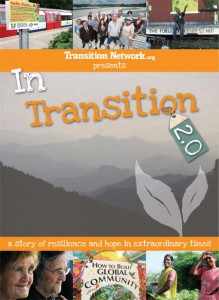 In Transition 2.0 is an inspirational immersion in the Transition movement, gathering stories from around the world of ordinary people doing extraordinary things. You’ll hear about communities printing their own money, growing food everywhere, localising their economies and setting up community power stations. It’s an idea that has gone viral, a social experiment that is about responding to uncertain times with solutions and optimism. In a world that is awash with gloom, here is a story of hope, ingenuity and the power of growing vegetables in unexpected places.
In Transition 2.0 is an inspirational immersion in the Transition movement, gathering stories from around the world of ordinary people doing extraordinary things. You’ll hear about communities printing their own money, growing food everywhere, localising their economies and setting up community power stations. It’s an idea that has gone viral, a social experiment that is about responding to uncertain times with solutions and optimism. In a world that is awash with gloom, here is a story of hope, ingenuity and the power of growing vegetables in unexpected places.
Here are some short interviews with the creative team that produced the film. Firstly producer and director Emma Goude of Green Lane Films:
Most of the camera work was done by Beccy Strong:
One of the things that brings the film to life is the animated sequences by animator Emilio Mula:
All of the music in the film is the work of composer and songwriter Rebecca Mayes:
Together, and with the support of Transition Network, they have drawn together stories from around the world showing Transition initiatives at the various stages of transitioning their communities. In order to be able to feature some of the stories from overseas, they ran a crowd-funding process which raised the money required. An international team of volunteers have translated the film in 18 languages. Also, in spite of telling stories from around the world, no-one set foot on an aeroplane in order to make this film, local camera-people being enlisted to film each sequence, making this one of the lowest-carbon international films ever produced.
 The film captures stories of Transition from around the world. You’ll hear about Transition Wayland in the US, and their very first meeting, how Transition Moss Side in Manchester have sought to raise awareness and engage the community by knocking on the area’s front doors, the amazing community visioning work of Aldeia das Amoreiras Sustent·vel (sustainable village of Amoreiras)in Portugal, how the Whitney Avenue Urban Farm in Pittsburgh has had a remarkable impact on the people around them, how Transition Kensal to Kilburn have set up the first food garden on a London underground station and how Transition Town Tooting‘s Trashcatchers Carnival, London was aremarkable and very memorable celebration of community and of taking care of the Earth.
The film captures stories of Transition from around the world. You’ll hear about Transition Wayland in the US, and their very first meeting, how Transition Moss Side in Manchester have sought to raise awareness and engage the community by knocking on the area’s front doors, the amazing community visioning work of Aldeia das Amoreiras Sustent·vel (sustainable village of Amoreiras)in Portugal, how the Whitney Avenue Urban Farm in Pittsburgh has had a remarkable impact on the people around them, how Transition Kensal to Kilburn have set up the first food garden on a London underground station and how Transition Town Tooting‘s Trashcatchers Carnival, London was aremarkable and very memorable celebration of community and of taking care of the Earth.
You’ll hear about the difficulties of doing Transition too, with the story of how Transition City Lancaster initially fell apart due to conflict but has since risen from the ashes and is now busy with a range of projects, and how Transition groups in London come together to support each other so as to minimise burnout. You’ll hear the story of Transition Monteveglio in Bologna, Italy and their very successful collaboration with the local council and a ground-breaking resolution, committing the council to deep sustainability and resilience-building. There’s Transition Streets from Totnes in Devon which works street-by-street, getting people together to meet, form new connections, and reduce their carbon footprints.
And then there are the emerging social enterprises, The Green Valley Grocer in Slaithwaite, Yorkshire whichraised shares from the community to take over the local grocers which was closing down, The Handmade Bakery, also in Slaithwaite, a really innovative model for how a young couple can set up a vibrant new business. They also make exquisite bread. There’s The Fujino Power Company, Japan, where, following the devastating tsunami and the Fukushima nuclear disaster, members of Transition Fujino responded by setting up a community energy company, with the intention of powering their whole valley using renewable energy. There’s The Lewes community solar power station, in Sussex which was funded by over £300,000 raised in community shares, and the Brixton Pound in London, thelocal complementary currency which can be spent in the area of Brixton in London with local traders – ‘money that sticks to Brixton’. We join them on the night they celebrate launching the UK’s first mobile phone-based complimentary currency.
We visit Heal the Soil CSA in Auroville, India, who help people start up small vegetable gardens in the rural villages of India, providing seeds and permaculture training in order to help them get started growing food, and Project Lyttelton in New Zealand, who employ Transition as one of the tools for their work building community resilience. When the recent earthquakes struck Lyttelton, the value of their work, especially its Time Bank, became apparent.
The film was previewed on February 2nd 2012 in most of the places who appeared in the film (apart from Monteveglio in Italy where it was -15 degrees!). It will be premiered in London in late March and will be generally available after that. ’In Transition 2.0′ is the sequel, unsurprisingly, to ‘In Transition 1.0′ which can be viewed in its entirety below: